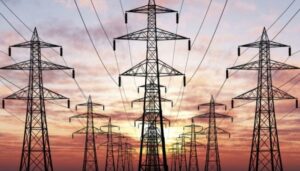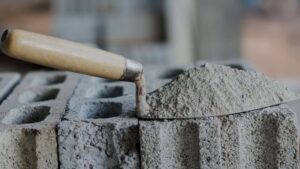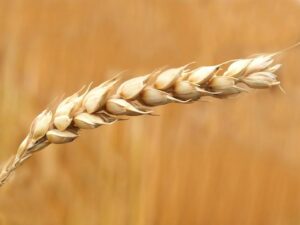
On April 7, PJSC Ukrnafta opened a tender for health insurance for its employees, according to the Prozoro system. According to the report, TAS Insurance Group had the lowest price offer of UAH 142.9 million for the expected cost of UAH 182.980 million.
Other insurance companies participating in the tender are Transmagistral – UAH 147.126 million, Arsenal Insurance – UAH 159.180 million, Unika – UAH 159.190 million, and VUSO – UAH 159.676 million.
The companies are awaiting the final decision.

The volume of industrial production in Germany in February decreased by 1.3% compared to the previous month, according to the country’s statistical office. Analysts on average expected a 1.1% decline, according to Trading Economics.
Following the revision, the estimate of industrial production growth in January was confirmed at 2%.
The decline in industrial production in February was primarily due to a 3.2% decline in the construction industry, the department said. Food production decreased by 5.3% and energy production by 3.3%.
Meanwhile, the output of electrical equipment increased by 3.3%. The output of capital goods increased by 0.2%, consumer goods decreased by 3%, and intermediate goods by 0.4%. In annual terms, industrial production in Germany fell by 4% in February.
http://relocation.com.ua/promvyrobnytstvo-v-nimechchyni-v-liutomu-znovu-skorotylosia/

In March, Ukraine increased electricity exports by 131% to 76.3 thousand MWh, while imports increased by 11% to 272.3 thousand MWh, Ukrainian energy and climate think tank DiXi Group reported citing Energy map.
According to its information, half of electricity exports went to Hungary – 38.1 thousand MWh. Another 17.8 thousand MWh, which amounted to 23% of total exports, went to Moldova, 11.1 thousand MWh (15%) to Romania, 8.4 thousand MWh (11%) to Slovakia, and 1 thousand MWh (1%) to Poland.
At the same time, it is noted that compared to March-2024, exports fell by half – then it amounted to 154.1 thousand MWh.
According to DiXi Group experts, out of 272.3 thousand MWh of imports, the largest share came from Hungary – 113.8 thousand MWh (42%). Another 52.7 thousand MWh (19%) came from Slovakia, 48.1 thousand MWh (18%) from Poland, 44.6 thousand MWh (16%) from Romania, and 13.2 thousand MWh (5%) from Moldova.
Compared to March 2014, when imports amounted to 168.3 thousand MWh, its figures in March 2015 increased by 1.6 times.
The increase in purchases was recorded from almost all available directions (from 4% to 480%), except for Slovakia – the volume of imports from this country decreased by 28%.
In total, in March, the volume of imports was almost 4 times higher than exports, DiXi Group notes.
As reported, in February 2025, Ukraine increased electricity imports by 33% to 244.2 thousand MWh compared to January and reduced exports by 61% to 33.1 thousand MWh.

In March 2025, registrations of new commercial vehicles (trucks and special vehicles) in Ukraine decreased by 6% compared to the same month in 2024, to 996 units, UkrAvtoprom reports in its telegram channel.
At the same time, the demand for such cars increased by 18% compared to February 2025.
According to the report, the leader of the month was the MAN brand with 170 units registered, while in March 2024 it was the second in the ranking, and in February 2025 – the third (78 units and 84 units, respectively), Renault fell to second place with 134 units (in March 2024 – 370 units), and Iveco was third with 88 units, which a year earlier ranked 13th with 24 cars.
The top five also included Ford – 83 units (in March-2024 – 36 units) and Peugeot – 68 units (64 units).
In total, in January-March 2025, the Ukrainian fleet of trucks and special vehicles was replenished with 2,813 thousand new vehicles, which is 2% less than in the same period in 2024.
As reported, in March 2014, the market for new commercial vehicles increased by 31.2% compared to February 2013, to 1,056 units.
In 2024, according to UkrAvtoprom, 12.9 thousand new commercial vehicles were registered in Ukraine, up 14% year-on-year.

Domestic cement and concrete producers are able to increase their capacity to meet the needs of recovery in any scenario, according to a survey of cement producers and consumers conducted by CBR last year.
“The study showed that even in a situation of high uncertainty, as it is now, with reduced international financing and extremely limited resources of the Ukrainian budget, cement producers and consumers are ready to quickly restore and expand capacity, ready to invest to meet the recovery demand,” said CBR researcher Tatiana Sytnyk at a meeting of the Confederation of Builders of Ukraine during the presentation of the results.
Cement production has partially recovered since 2023, but consumption is heavily dependent on government funding
According to the CBR study, in 2022, cement production fell significantly due to a decline in domestic consumption – to 5.4 million tons compared to 11 million tons in 2021. However, in 2023-2024, production stabilized, reaching 7.4 million tons and 7.97 million tons respectively. Moreover, according to the interviewed experts, the volume of 8 million tons was the maximum value during the war. After the war is over and the recovery begins, peak cement production can reach a maximum of 12 million tons, but the industry will reach this level in the third or fourth year of recovery.
The main question being discussed by the professional community is whether there will be enough cement to meet the challenges of recovery. It was made more acute by a study conducted in 2022 by the State Foreign Expertise Service, which was based on an optimistic scenario that assumed that there would be enough money for the recovery and that the entire process would take three years, said Pavlo Kachur, chairman of Ukrcement.
“Such calculations assumed a shortage of construction materials, particularly cement. But now the trade union community is assessing the challenges for the industry, taking into account the experience of three years of war and predicting that the recovery will begin primarily with demining, strengthening the demarcation line, and restoring energy facilities. We will start large-scale construction in about the third or fourth year,” he commented to Interfax-Ukraine.
Currently, cement plants are unevenly utilized: facilities in western Ukraine have better utilization, while those in the south and east have worse utilization. In 2022, cement plants operated at a loss, with production not covering fixed costs, but the companies retained their staff. In 2023, they reached break-even operations, as production allowed them to cover fixed costs.
As for cement consumers, the study surveyed producers of concrete, aerated concrete and other building materials representing businesses of various sizes, from small to large businesses, from all regions.
“The study showed that our cement is quite acceptable for producers in terms of quality and even price. It rose in price by 20% in 2023 and by 10% in 2024, in line with inflation,” Kachur said.
Two-thirds of the surveyed cement consumers reported that they increased production in 2023, 20% returned to the pre-war production volume, and there were even those who exceeded it (concrete for infrastructure facilities). However, a year later, in 2024, when the survey was conducted, the mood of cement consumers was rather restrained: they identified the risks of a reduction due to the instability of government funding.
The industry is ready to invest in modernization
According to Kachur, in general, the market experienced a slight decline in cement consumption in 2023, as large-scale protection and restoration projects depend on government funding, and civilian developers are not ready to resume full activity at this stage. Thus, residential and commercial real estate projects have significantly decreased compared to pre-war levels. The expert also called the issue of human resources critical for the industry. New specialists need to be trained to replace mobilized and relocated industry employees.
“This (training, design, and fundraising) will take some time, which will be enough for cement producers to fill the market. First of all, to invest in modernization and expansion. In particular, there are already two ready-made projects for the construction of new kilns to meet the highest modern requirements in Kryvyi Rih and Ivano-Frankivsk and the resource of the Baltsem plant (before the war, it produced about 200 thousand tons of cement with a capacity of 4 million tons),” he said.
The study notes that it is unlikely that completely new plants will be built, but a year is enough to modernize the kiln. It is estimated that at least two plants will launch additional furnaces, which will produce 2 million tons. For example, Kryvyi Rih Cement has already received a special permit to develop the Maryansky limestone deposit (60 km from the plant) and has a plan to build a kiln in the quarry itself to produce clinker. Modernization of the Kramatorsk-based Garmata (nationalized) and Balakliya (Baltsem) plants is also possible.
“Cement companies are ready to make rapid investments in modernization and launch additional kilns when the recovery begins to be the first to respond to the market. The companies are waiting for signals to start the expansion. This could be news about the allocation of funds for recovery and/or demand reaching the level of 9.5 million tons,” explained Sytnyk.
Domestic cement competes on equal terms with European cement
Among the reserves for the critical high demand for recovery, experts also mention the possible return of cement imports to Ukraine. Currently, Ukraine does not import but exports this product.
“We must honestly admit that during the war, exports actually save our industry. Before the war, in 2021, total cement exports amounted to about 56 thousand tons, and in 2024 – 1.7 million tons, which is about 15% of what we produce, which is a large share. We are constantly telling our neighbors: “As soon as Ukrainian consumption picks up, the situation will change dramatically, it will be more profitable for us to transport cement to construction sites in Ukraine, and the issue of imports will become relevant,” Kachur says.
The CBR study states that if reconstruction projects are mainly funded by the EU, there is a high probability of an increase in cement imports from Europe, primarily for infrastructure projects.
The expert recalled the possible risks for the industry at this stage, as there is an overproduction of cement in the world today. Therefore, most developed countries can fully cover all the needs of recovery projects, which can harm domestic producers.
“I want to voice my position publicly: the market (at the recovery stage) of Ukraine should be localized as much as possible with domestic products and available only to countries that supported us during the war. Because we have to apply strict measures to countries that support the aggressor country during the war but want to join the recovery to protect their market,” Kachur emphasized.

According to the forecast of the Food and Agriculture Organization of the United Nations (FAO), the global wheat production in 2025 will amount to 795 mln tonnes, which is the same as in 2024. The organization recorded mixed trends among the largest producing countries.
In the EU, production is expected to increase to 135.5 million tons (+12% yoy) due to the expansion of crops and improved weather conditions. At the same time, the FAO points to the lack of precipitation in the eastern part of the bloc, which may affect the final yield.
In Russia, wheat production is expected to decline due to low soil moisture and reduced acreage. A similar situation is observed in the US, where drought has affected winter wheat crops, which will lead to a decrease in the overall harvest.
According to FAO, wheat production in Ukraine will be below the five-year average. The main reasons are the ongoing armed conflict and dry weather conditions.
In Canada, wheat acreage is expected to increase due to price incentives, but this will be balanced by lower yields. Production will remain at the level of 2024, but will exceed the five-year average.
FAO predicts that India’s harvest will reach a record level of 115.4 million tons. The growth is due to the expansion of acreage, government subsidies and high market prices.
In the Middle East and North Africa, the harvest is expected to decline amid a lack of precipitation. In Argentina, production is expected to increase due to the expansion of crops. In Australia, a moderate decline in harvest volume is forecast, but the figure will remain above 30 million tons.
According to the FAO, the global grain production in 2024 amounted to 2.849 billion tons, which is 0.3% lower year-on-year. The forecast of grain consumption in 2024/25 marketing year is 2.868 billion tons, including 1.534 billion tons of feed grains (+1.1% yoy) and 795.4 million tons of wheat, which is slightly lower than the previous season.
According to national sources, Serbia plans to keep the wheat harvest within 3 mln tons. It is expected that weather conditions will allow to achieve above-average results. The country will continue to export to Italy, Turkey and other countries in the region.
Earlier, the information and analytical center Experts Club released the analysis of the main wheat producers by countries for the period of 1991-2023 – https://youtube.com/shorts/NMwidrCI6iY?si=hE3BXbdvWOG30Nld